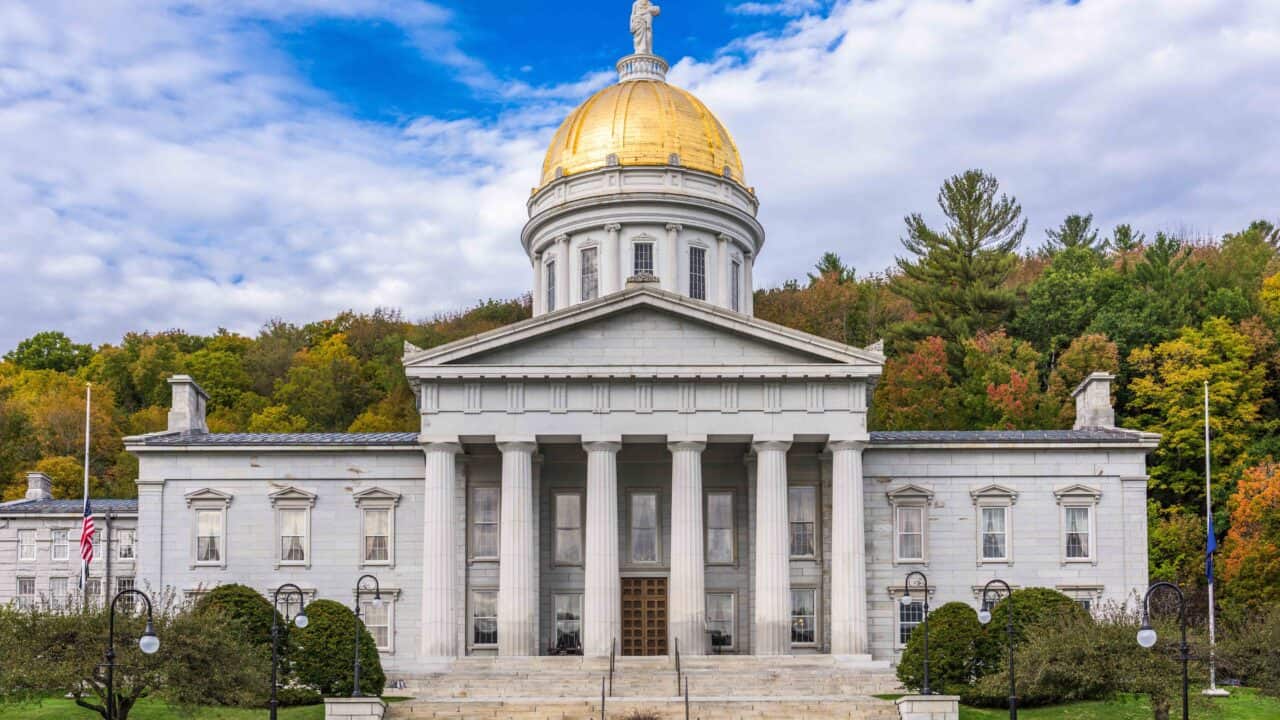 The Vermont State House in Montpelier, Vermont, USA.
The Vermont State House in Montpelier, Vermont, USA.
A sweeping proposal to fundamentally transform the heating fuel industry in Vermont has passed the state Senate, threatening higher energy prices and carbon taxes for residents of the Green Mountain State.
The original bill, S.5, establishes a system of carbon credits to subsidize the installation of “clean” heating systems. Fuel dealers would be required to purchase these credits to offset carbon emissions from any traditional heating fuel they sell in the state of Vermont.
In raising the average household’s heating bill by hundreds, if not thousands of dollars, the bill effectively imposes a regressive new carbon tax on Vermont families who just want to keep warm in a state where temperatures frequently dip below zero.
Strikingly, the true cost of the clean heat proposal is unknown. Even as S.5 moves on to the House, the bill still lacks a fiscal note or details on exactly how the carbon tax scheme will be implemented.
Although the legislature has not attempted to put a dollar figure on their new mandate, several recent analyses give a preview of the enormous costs that S.5 would foist upon companies and consumers. By mandating billions in expenditures on new systems and the purchase of carbon credits, consumers will ultimately shoulder the costs in the form of higher prices for heating fuel.
The Ethan Allen Institute (EAI) estimates that the Clean Heat Standard would require $5 billion in new spending over the next five years on installation of green heating systems and weatherization. An earlier, more conservative analysis from Secretary of Natural Resources Julie Moore put that figure at $2 billion. That translates to a price hike anywhere from 70 cents to $4.00 per gallon on home heating fuels, which 2/3 of Vermonters depend on to make it through the winter.
S.5 also allows residents and businesses to “earn” credits if they switch to green-energy heating systems. But EAI’s fiscal analysis reveals that low- and middle-income residents simply cannot afford the initial costs of installing new equipment that complies with the clean heat mandate, forcing them to deal with sharply higher energy bills.
Senator Mark MacDonald (D), a sponsor of S.5, helpfully acknowledged the regressive nature of the carbon tax he supports during a committee hearing. “We don’t do things based on helping poor people,” he said. “We do things to save the world.”
That hasn’t stopped ordinary Vermonters from making their voices heard. Legislators in the Democratic-dominated supermajority have received a deluge of emails and phone calls from their constituents, urging them to oppose the new carbon tax imposed by S.5. In the ensuing scramble to recover from this unprecedented public backlash, S.5 has been amended to first require a study on whether the Clean Heat Standard is even feasible, followed by a report from the Public Utilities Commission outlining the details of the program. The legislature would need to approve the fleshed-out proposal once that process is completed in 2025.
However, S.5 would still establish the unwanted credit system for heating fuels, regardless of any future vote in the legislature. Importantly, the credit system would also be required to meet the stringent greenhouse gas reduction mandates imposed by the 2020 Global Warming Solutions Act – regardless of whether it is found to be feasible by the forthcoming study. Even in its amended form, S.5 will reshape the market for fuel and severely drive up the cost of energy in the small Northeastern state.
Small businesses that sell heating fuel would be hit the hardest. “More than one hundred small family fuel dealers … will be obligated under the law and have to compete for credits with much larger and well-funded for-profit businesses,” said Matt Cota of the Vermont Fuel Dealers Association.
The idea for a statewide carbon tax and credit system was first introduced during the 2022 session under H.715, the Clean Heat Standard. Despite receiving overwhelming support in the legislature, that bill was quickly vetoed by Gov. Phil Scott – Vermont’s only statewide Republican elected official. Last May, House lawmakers fell just one vote short of the necessary 2/3 majority to override Gov. Scott’s veto.
In the wake of the Clean Heat Standard’s defeat, advocates are now referring to the 2023 version of the bill as the “Affordable Heat Standard,” despite the fact that the two proposals are nearly identical. Simply labeling a bill as affordable does not make it so.
Democrats and Progressives handily regained their veto-proof majority in November, winning 109 of 150 seats in the House and dealing a devastating blow to Gov. Scott’s ability to block the rebranded Clean Heat Standard. Should S. 5 receive unified left-wing support in both chambers, the governor may be helpless to stop the largest tax hike in Vermont state history. This is bad news for Vermonters’ pocketbooks and their access to affordable energy.

